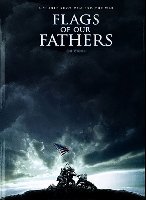Sunday, November 05, 2006
Flags of Our Fathers
 I went through a period of a couple years during which I only read two books, over and over again. One of them was Sun Tzu's Art of War, so I can tell you with great authority that, since ancient times, military strategists have understood that the first step in mobilizing a nation to war is to win the propaganda battle for the support of your own people. That is what Clint Eastwood's Flags of Our Fathers is all about.
I went through a period of a couple years during which I only read two books, over and over again. One of them was Sun Tzu's Art of War, so I can tell you with great authority that, since ancient times, military strategists have understood that the first step in mobilizing a nation to war is to win the propaganda battle for the support of your own people. That is what Clint Eastwood's Flags of Our Fathers is all about.The movie, set mainly during WWII, cuts between the battle of Iwo Jima and the propanda / war bonds drive into which the hapless Iwo Jima flag-raisers are recruited. For good measure, there are also a few scenes set in modern times of the Iwo Jima veterans in old age.
In 1944, America was on the verge of bankruptcy. The US public had grown tired of war and had started to think about ducking out of what at times seemed to be a losing battle. The bloody battle of Iwo Jima was the scene of the famous photograph of five American soldiers raising the US flag over the tiny island battlefield. This literally iconic photo served to boost the flagging morale of the American public. The military quickly capitalized on the public's love of the photo by recruiting a few of the surviving soldiers to participate in a massive war bonds drive.
At first, I was relatively non-plussed by the war scenes. In and of themselves, they add nothing more to the genre that hasn't already been done (and probably better) by Saving Private Ryan and Band of Brothers.
However, the war scenes serve two major functions. First, unlike Saving Private Ryan, this movie has come out while the Western world is at war, so it's useful to be reminded of just how horrible, inhuman and wasteful war is. Second, the gritty reality of the war scenes serves as a contrast to the goofy unreality of the propaganda campaign. (There is a scene of dark comedy involving ice-cream sculptures that has to be seen to be fully appreciated.)
But while the propaganda campaign often seems foolish, even to the characters, it nonetheless serves an invaluable purpose. It helps preserve in the minds of the public the black-and-white morality and heroism of the war which of course cannot really exist in this messy, shades-of-grey world of ours. Second, it raises funds for the war from a nation on the brink of economic collapse. There is a stunning scene in which the war-time spin doctor character, played by John Slatterly, lays out the blunt realities of America's crumbling finances. In one speech, the movie brilliantly succeeds in showing the moral need for a nation to lie, cheat and steal from its own people during war.
The Slatterly character stood out to me. That character is my people. Some of you who read this are also my people, so you know what I mean.
Another actor I noticed for different reasons was Neal McDonough of Band of Brothers fame. Guess what: he plays a crusty, steely-eyed army officer! Apparently his agent has never heard the term 'type-casting'.
On the whole, this movie is a phenomenal achievement in exposing the contradiction between the fictions we create about war and the horrid realities of it. At one point, one of the characters talks about war as "a waste". In the end, that is all war can be: a waste of life, potential and goods. It should always be the last, last, last resort. On the eve of Remembrance Day, I found it salutary to be reminded of that.
I should say I have a great bias about this movie. My father, who passed away a year and a half ago, was a WWII veteran who saw combat in spite of being in the Dental Corps. There is a scene in the movie, set in modern times, in which the son of a veteran sits by the hospital death bed of his father and receives his father's last words, his regrets. I've been there, literally. I'm not a tearful sort normally, but I cried all the way through that scene.
Even with this scene subtracted, this is a powerful movie. I can't recommend it strongly enough.
posted by Mentok @ 7:32 PM,
![]()
2 Comments:
- At 4:07 PM, Library Mama said...
-
I can't believe you haven't received any comments over here. This is such a great review.
I wasn't going to review this movie because I thought you had said it all.
Then I thought of a new angle and decided to do it anyway.
You know, John Slattery is only five months older than you, but he looks years older than you. - At 11:19 AM, Bathroom Hippo said...
-
I haven't seen it yet (still). That's why I haven't commented. I really want to go see it.


